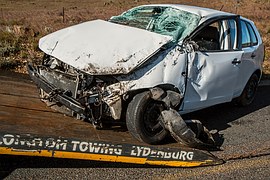Contributory Negligence: Can I Recover for an Accident if I’m Negligent, Even in the Smallest Way?
The law of five jurisdictions, Alabama, District of Columbia*, Maryland, North Carolina, Virginia, contains the doctrine of “contributory negligence”.

An experienced Baltimore car and automobile accident lawyer Attorney Eric T. Kirk will advise clients that this principle, a leftover vestige from the common law of England, hundreds of years old, operates to deny any financial recovery whatsoever to a car accident victim found to be responsible, in even the smallest measure, for causing or contributing to the accident. Other states have moved to a system of comparative fault, which allows a plaintiff injured in an auto accident, but whose fault contributed to some extent to the accident, to recover their damages, so long as their percentage of fault does not exceed that of the defendant. Whatever the award, it is then reduced by the percentage of fault attributed to the plaintiff. What if the injured person happened to be a child? Children under five years of age can never cause or contribute to their injuries. Children over 5 are judged by the standard of conduct that children of similar age, intelligence and experience and development would be held to under similar circumstances.
The application of the doctrine can be harsh and operate to deny recovery to even the most clearly injure individuals.
The law imposes a duty on every driver to see everything they should have seen [even if they didn’t] had “they properly exercised his faulty of vision”.

Colmes v. Zamoiski, 294 A.2d 120 [parentthitical comment added]. There, the court noted that a driver who fails to see what they should have is essentially the same as a blind person operating that vehicle. If that driver fails to perceive something that they should have perceived, and that failure causes or contributes to a Maryland car or automobile accident, then that failure is considered contributory negligence if that person is a plaintiff. This is so even if, e.g. a car is stopped on the highway without flashers. In specific instances, the presence of fog, smoke, rain, snow and the like may excuse the failure to perceive.
Solace from the harsh application of contributory negligence principles may sometimes be found in the notion of last clear chance.
A plaintiff who caused or contributed to a Maryland car accident would normally be barred from any recovery from the defendant unless that defendant had a new opportunity – a last clear chance- and failed to prevent the harm to the plaintiff. A skilled car and automobile accident lawyer may be able to successfully argue for and obtain a financial recovery for a negligent plaintiff using this concept. The caveat here is that the final act of that plaintiff cannot be the negligent act, as the rationale for the rule is that a defendant, who has a fresh opportunity to avoid the peril, and fails to, is, in fact, the proximate cause of that accident.
Discuss your case with an experienced Baltimore car and automobile accident lawyer to determine if “contributory negligence” is a factor in your case, and possible countermeasures.
* Washington DC law provides a limited exception to the harsh rule of contributory negligence. “The negligence of a pedestrian, bicyclist, or other non-motorized user of a public highway involved in a collision with a motor vehicle shall not bar the plaintiff’s recovery unless the plaintiff’s negligence is [g]reater than the aggregated total amount of negligence of all of the defendants”



